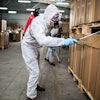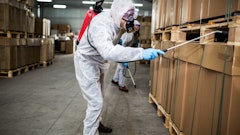Some of the area's biggest soup kitchens are planning to improve the safety of their food.
The changes will include having to figure out how to reject raw and prepared food donations by well-meaning people. One answer suggested by health officials: Solicit grocery-store gift cards, rather than donations of turkeys at Thanksgiving.
Those are some of the implications from the Bibb County Health Department's push to regulate soup kitchens as restaurants under existing state laws.
Naomi Ladson, social services director for the area's Salvation Army, said she's excited about the new regulations. She guesses the agency is close to achieving state compliance in its kitchen facilities and with its equipment, but will need to work with its donors and suppliers. The end goal of safer food is important, she said.
"These are human services that need to be taken care of in a professional, health-aware manner," she said.
Rick Craft, a Bibb County health inspector, said the inspections and commercial kitchen-quality standards are required under a five-year-old revision of state regulations. The health department plans to work with agencies to get them up to code as smoothly, and as cheaply, as possible, he said.
"Our biggest purpose is to help everyone provide a safe meal," Craft said at a training session. "A lot of people are doing that, but now we're going to give a little additional help to make certain."
Inspected kitchens will also not be able to process non-inspected cooking, such as church potlucks.
The state standards mean soup kitchens will have to ensure they have professional-grade utensils, plenty of hot water and ceilings that can be easily cleaned.
Jeff Nicklas, executive director of the Macon Rescue Mission, said he doesn't think he'll have to add much equipment, except perhaps some freezers and a professional-grade microwave oven. He predicted most of the work will come in working with donors and food handlers.
"It's going to be a little bit of expense, but it's not going to break us," Nicklas predicted.
It's too early to tell how much work will be required. Craft said the health department doesn't know of every church that cooks food for the general public. Some of the soup kitchens may not know the state code, and the health inspectors don't yet know what the kitchens may need.
Craft predicted that most of the work will involve food's chain of custody, so food is always under the control of an inspected agency. Instead of a soup kitchen accepting food bought at a grocery store and brought by a donor, for example, the donor could buy a gift card and allow the kitchen to purchase the food directly.
"If it's just a gentleman who cooks 30 turkeys and brings them to you, you can't take them," Craft said. That's because it's impossible to know whether somebody purposefully allowed food to begin to rot before donating it.
Debra Garnand, associate director of Macon Outreach, said her organization at Mulberry Street United Methodist Church serves about 170 meals per day. She predicted her organization's food costs will go up, but that her kitchen is already close to code.
Craft noted the potential dangers: "One-hundred and seventy cases of foodborne illness at Thanksgiving? Not good news," he said.
Source: The Macon Telegraph, GA


















